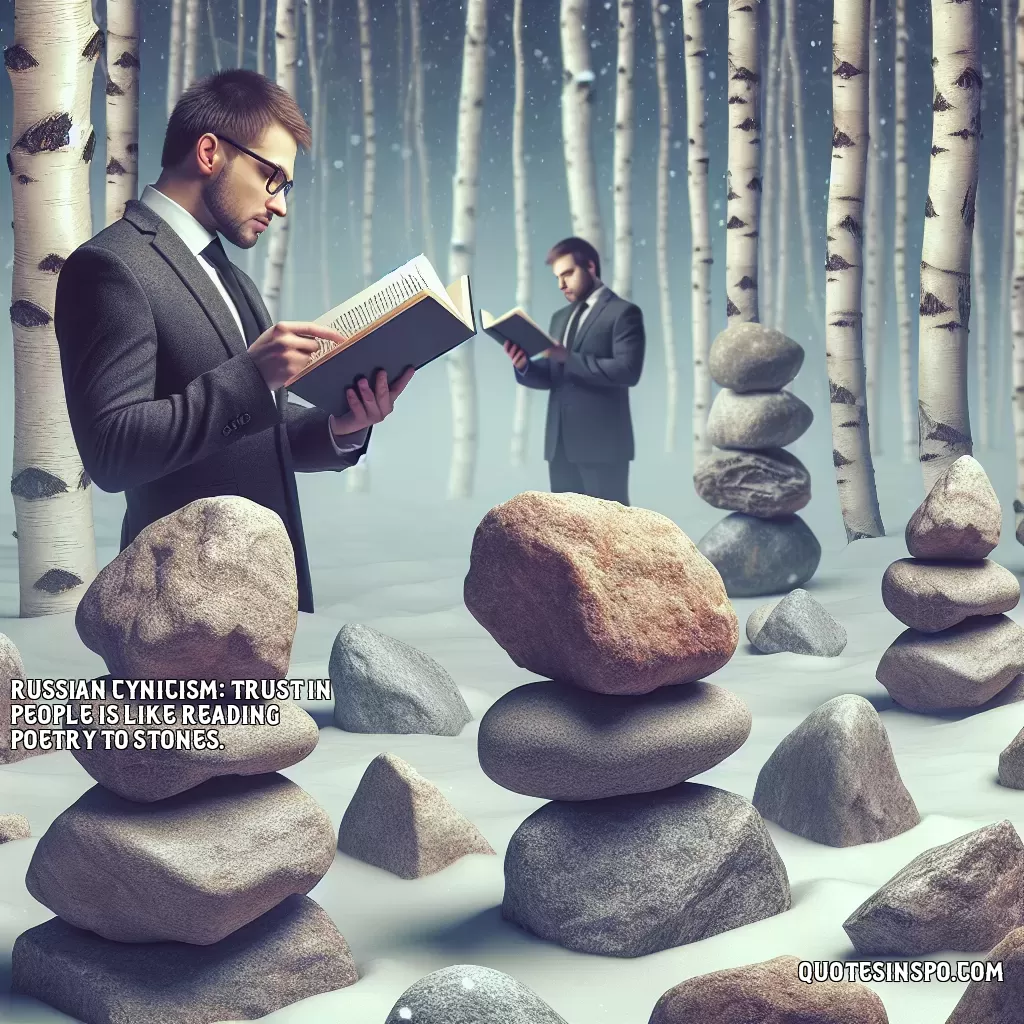
Russian Cynicism: Trust in people is like reading poetry to stones.

Russian Cynicism: Trust in people is like reading poetry to stones.
The quote "Russian Cynicism: Trust in people is like reading poetry to stones" encapsulates a profound skepticism towards human nature and relationships. This statement leans heavily into the philosophy often attributed to Russian cynicism, which is marked by a stark, sometimes bleak view of human motives and capabilities. To trust in people, according to this saying, is an exercise in futility akin to reading poetry to stones. Poetry, which is rich in emotion, significance, and beauty, demands an audience capable of appreciating and responding to its intricacies. Stones, however, are lifeless and unresponsive; they cannot grasp the nuances or the emotional depth poetry offers. Thus, the comparison suggests that people, much like stones, do not appreciate or reciprocate trust with the desired sensitivity or understanding. This outlook reflects a belief that human beings are inherently unreliable or indifferent, failing to meet the expectations placed upon them when trusted. The simile underscores a perception of human apathy or insensitivity, highlighting the perceived futility of extending trust or belief in others' good intentions. This cynicism could stem from personal experiences or historical context where betrayal, deception, and disappointment were prevalent, leading to the conclusion that investing trust in people is as pointless as engaging stones with poetry. It implies a world where human interactions are driven by self-interest rather than mutual respect or genuine connection, cautioning against naive optimism in our interactions. This bleak view might resonate with anyone who has been let down by others, advocating for a guarded approach to trust.
Quote By: Vladimir Sorokin
Vladimir Sorokin is a prominent Russian novelist and playwright, known for his provocative and unconventional literary style that often challenges societal norms and explores the complexities of contemporary Russian identity. Born on August 7, 1955, in a small village near Moscow, Sorokin grew up in a family with a background in engineering and technical science, which greatly influenced his view of society and technology. He graduated from the Gorky Institute of Literature in 1977, a period during which he began to publish short stories and plays, gaining attention for his unique voice.
Sorokin's literary career took off in the 1980s with his early works, which were marked by a blend of surrealism, dystopian themes, and biting satire. His novel "The Queue," published in 1983, is a noteworthy example that captures the absurdities of life in Soviet Russia through the story of people waiting in line for an unspecified product. The book became a significant part of Russian literature, showcasing Sorokin's talent for reflecting the surreal aspects of daily life under a totalitarian regime.
Throughout his career, Vladimir Sorokin has produced a wide array of works, including novels such as "Blue Lard," "Day of the Oprichnik," and "The Blizzard." His writings often delve into themes of power, identity, and the potential for human depravity, drawing criticism and praise alike for their unflinching honesty. Sorokin's style is characterized by a postmodern approach, often interspersing elements of science fiction and historical allegory, which makes his work both challenging and engaging for readers.
In addition to his fiction, Sorokin has made significant contributions to contemporary Russian theater and has been involved in various artistic projects that push the boundaries of traditional storytelling. His works have been translated into multiple languages and continue to receive international acclaim, cementing Vladimir Sorokin's status as one of Russia's most influential and original literary figures of the late 20th and early 21st centuries. Through his bold narratives and distinctive voice, Sorokin invites readers to reconsider the complexities of life, society, and the human condition in a rapidly changing world.